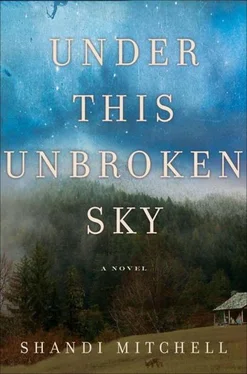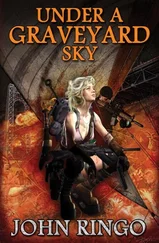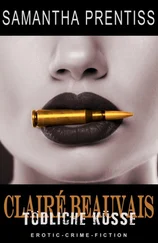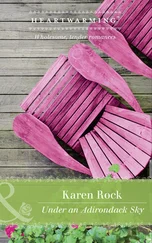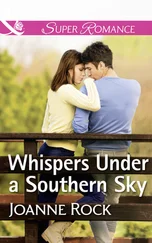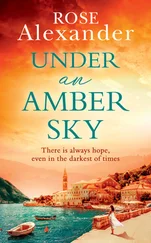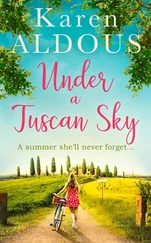Teodor could tell when he pushed his fingers gently into the dirt and found no resistance. Sliding his hand back out, he smelled the sweet scent. He rubbed the warm, moist soil between his fingers and let it fall loosely back to the earth. This land was fertile. If this quarter-section, all one hundred and sixty acres, was planted with wheat, Teodor would indeed be a wealthy man. “This is where we begin,” he told Myron.
They clear-cut the first acre of brush and pile it in massive heaps. They coat themselves with mud and kerosene to stave off the blackflies and mosquitoes. Their hands and faces swell beyond recognition from the bites. After the first few days, they give up trying to swat away their attackers. The insects’ constant drone becomes a part of the daily sound swarming around their heads. One sweltering mid-afternoon, Teodor abruptly stops as he heaves up a root, acutely aware that he can hear nothing. He shakes his head, slaps at his ears. For a moment he thinks he has gone deaf, before realizing the bugs have been driven away by the heat.
When the trees are too large to be dug out, they are grubbed. Teodor chops and hacks through the roots around the base as Myron shimmies up twenty feet to fasten the rope around the trunk. The horse strains, its withers quivering, slathered in sweat, as Myron hollers and slaps its rump, until the tree finally groans and falls cracking to the ground. Then it is skidded to the growing woodpile.
Fuel for the woodstove is set aside to be gathered in the fall. The longest, straightest trunks are stacked for building material, and skinny poplars tagged for fence poles. Roots and branches are lit on fire. The smoke that stings their eyes and chokes their breath mercifully wards off the flies. Deep into the night, the glowing bonfires dot the horizon like so many rising suns.
They pry two tons of rocks from the ground, stack them one by one in the cart, and haul them to the property line that divides the two sections. There they unload and pile the stone to form a long, low wall. They hack, saw, rip, and curse at the roots that refuse to let go. They use picks, axes, shovels, and claw with their hands to reach the rich black soil. They clear an extra twenty feet around the entire perimeter to serve as a firebreak. And finally they plow—one agonizing foot at a time—coaxing this mistress to yield herself.
As Teodor tends the earth, he heals himself. In the field, he forgets about the past, forgets about the prison walls, and focuses only on the job at hand. His muscles grow taut and firm. He puts on weight. His chest fills out his baggy shirt and his pants stop slipping below his waist. His hands grow strong, the plow becomes lighter, his strides longer, and the land responds to his request to open. Deep furrows bloom upward, aching to be seeded.
But in those first days, he could barely lift the smallest rock. He had to carry it in both hands; his back stooped over, his knees bowed, he’d waddle to the cart where Myron was loading five stones to his one. His son would take the rock from him and toss it effortlessly to the front of the cart. Behind the plow, driving the horse, he reined the horse in hard, afraid to unleash its harnessed strength. Even holding the animal back, he was forced to run behind its lurching thrusts. The wide, leather plow strap cut into his shoulders, branding him black-and-blue. Once, he fell and was dragged through the twisted roots and jutting twigs.
Myron halted the horse, but Teodor screamed, “Keep going!” And when Myron hesitated, he shouted louder, “Go!” He struggled to his feet and slammed the full force of his remaining energy down into the wooden handles through the iron blade into the earth. He’d pushed what felt like a mile, only to find he’d made a twenty-foot run. His body dripping with sweat, his hands a bloody mash of blisters, his lungs bursting—he’d holler, Whoa!
And Myron, who was leading, rolling stones out of the way, and the horse that was just getting up to speed, would look back at him, wondering why they had stopped. Teodor would bend down on one knee, supporting his weight on an outstretched arm pressed against the ground, sucking back air, and curse his damn boots as he made a big show of retying a shoelace that he said had come undone.
Myron never says a word when he has to wait for his father. He stands silently a few feet away and busies himself looking at the horse’s hooves or stares off, chewing on a blade of grass, as if assessing the time of day by the sun’s position. Sometimes he has a sip of water, pretending to gulp back more, before passing the canteen to his father to drain. If he hurts, he never lets his father see it. To Teodor, Myron seems oblivious to the briars clawing his skin and impervious to the stings and bites welting his body. He tries to remember his own youth, when he too felt invincible and his body did his bidding without complaint, but that memory is lost.
Teodor feels every bump and bruise. He feels his hands dry and crack, not from the sun, but from the dirt leaching the water from his skin. Dust to dust. Blisters harden into thick calluses, robbing his fingers of sensation. He no longer feels how hot the soup is in a cup. He can’t feel the softness of Maria’s skin, only his own roughness against her body. He feels the sun blaze into his neck, face, and forearms, his skin on fire, shocking him with pain at the slightest touch. His skin bubbles, peels, and itches, then finally turns a deep, rich brown, as if he has taken on the color of the earth.
At midday, Ivan and Petro can be seen running toward them. Two small dark flecks far in the distance. Dancing in the heat waves, growing into flailing arms and legs, until finally arriving with lunch in hand. Ivan always wins the race to his father. Myron unhitches the horse and lets it graze. The men eat cold pyrohy and flatbread with lard and the last of the chokecherry jam, while the boys walk up and down the fresh furrows collecting worms, round stones, the occasional bone, and, once, an Indian arrowhead.
Petro found the arrowhead. Ivan took it from him. Petro grabbed for it and then the boys were tumbling and rolling in the dust. When Petro started to cry and blood was dripping from Ivan’s nose, Teodor separated them by the scruff of the neck, took the arrowhead from Ivan’s clutched hand, and, in one smooth, swift movement, hurled it far into the bush. He didn’t say a word to the boys, just told Myron to hitch up the horse and slipped into the plow’s harness.
The two boys watched the work start up again; his father didn’t say, Dopobachenia — until we see each other again . Ivan felt the urge to cry but punched Petro in the arm instead and raced home, not caring whether his cousin caught up.
The first day, Teodor plows eighty feet. An acre is roughly two hundred and eight feet by two hundred and eight feet. It takes him four days to reach the end of the first row. When he finally pulls the plow around and starts the next furrow, Myron is ten rows ahead of him, clearing the rocks and roots. Two hundred and seven more turns to make. Teodor counts his steps as he did in prison, measuring down the distance. Myron only counts the turns. At the eightieth turn, Teodor begins closing the gap. By the one hundred and tenth turn, Myron is once again scrambling to stay ahead of his father. By the one hundred and fiftieth turn, they are working in syncopated pace. Two men and a horse crossing back and forth with the precision of a pendulum.
When the day finally loses light, Teodor and Myron stumble home, unable to talk, their bodies one numb ache. They arrive blackened with the earth’s body. Her dirt ground so deep into their skin that only the whites of their eyes announce their arrival. They scrub her dust from their bodies outside at the metal tub that Maria fills with hot water as the sun sets. After the first plunge of their hands, the water mires into mud. It doesn’t matter how much they scrub, the dirt never releases itself from their pores. It clings under their nails, obliterates their fingerprints, and burrows deep into their ears. It cries from their tear ducts. When they blow their noses, white handkerchiefs turn black.
Читать дальше
